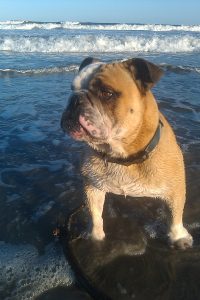
From Penn Vet
Non-Hodgkin’s lymphoma (NHL) is the most common cancer of the blood in dogs. It is a cancer of white blood cells known as lymphocytes and it occurs in lymphoid tissues such as the peripheral lymph nodes, spleen and bone marrow.
The disease frequently occurs in middle aged and older dogs (median age 6-9 years). Certain breeds are predisposed to lymphoma and include Boxers, Bull Mastiffs, Basset Hounds, Saint Bernards, Scottish Terriers, Airedales, and Bulldogs.
Most dogs with lymphoma develop enlarged lymph nodes, often felt as firm swellings underneath the jaw (submandibular lymphadenopathy), in front of the shoulder blades (prescapular lymphadenopathy) and/or behind the knees (popliteal lymphadenopathy). The most common subtype of NHL in dogs is Diffuse Large B-Cell Lymphoma.
Combinations of systemic chemotherapy drugs that inhibit cell division and kill rapidly dividing cells lead to clinical remission in approximately 75% of dogs. However, the majority of canine patients relapse with lethal, drug-resistant lymphoma within 6 to 9 months of diagnosis and treatment.
This statistic demonstrates that current therapies to treat canine B-NHL are insufficient to eliminate all the cancer cells and provide a “cure” for this disease.
Dr. Mason’s laboratory is working on two different immune therapy approaches to treat lymphoma. The first is aimed at preventing disease relapse in dogs that have been successfully treated with chemotherapy. The second approach is for dogs that have relapsed with lymphoma and are developing chemotherapy drug resistant disease.
An Immune Therapy Approach
Dr. Mason’s laboratory is working on an immune therapy approach to treat dogs that have relapsed with lymphoma and are developing chemotherapy drug resistant disease. In this approach to addressing canine lymphoma, immune cells (known as T cells) are taken from the peripheral blood, genetically modified in the laboratory to express a receptor that recognizes B cells, and then expanded to produce large numbers of tumor specific T cells outside of the body. These genetically modified T cells are then infused back into the body where they will seek out B cells and kill them. This process is known as adoptive immunotherapy and the cells that are infused into the patients are known as chimeric antigen receptor T cells (CAR T cells). This approach has shown dramatic results in human patients with leukemias at the School of Medicine at Penn and is now being adopted for use in dogs with lymphomas.
Our Goals for this Study
The purpose of this study is to determine the safety and effectiveness of canine CAR T cells to specifically target and eliminate B cells in dogs with relapsed B cell lymphoma. Client owned dogs with relapsed B cell lymphoma are enrolled into the study and receive a short course of chemotherapy prior to infusion of autologous CD20-specific CAR T cells. The presence of these modified T cells will be determined at specific time points after the infusion. Dr. Mason’s team will also investigate whether these T cells can induce a reduction in tumor burden and prolong the dogs’ survival. We have just commenced clinical trials with this promising, cutting edge therapy and the responses from referring oncologists and primary care veterinarians have been positive and enthusiastic. Currently, we are the only institution in the world that is bringing this advanced technology into the veterinary clinic. It has taken three years of pre-clinical work in the laboratory to adopt these techniques for use in the dog, and we are now in the clinical trial phase.
Although currently in the clinical trial phase in veterinary medicine, immune-based approaches to cancer are rapidly coming on-line with FDA approval for use in human cancer patients and we expect the same to be forthcoming in veterinary medicine. Penn Vet is a leader in this area and is positioned to integrate immune-based therapies (vaccines, antibodies, adoptive cell transfer) into its interdisciplinary approach to cancer as these modalities become accepted into practice in veterinary medicine.
Current Lymphoma Clinical Trials
Re-directed Autologous T cell Therapy for drug resistant or refractory CD20+ B cell lymphoma
Immune cells (known as T cells) are taken from the peripheral blood, stimulated, expanded and genetically modified in the laboratory to express a surface receptor that recognizes B cells
RNA-transfected CD40-B Cell Vaccines for Dogs With Newly Diagnosed Lymphoma
Determine whether a cell based vaccine can prevent the return of lymphoma after standard chemotherapy treatment.
Contact Mason Immunotherapy for more information. See article for contact information.








